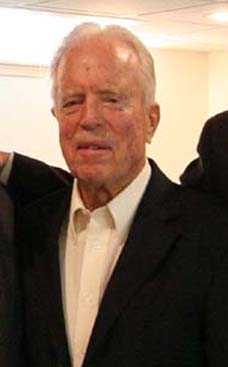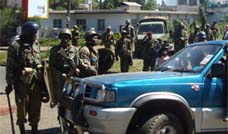
The “president’s call to service,” as the White House refers to the 2002 State of the Union address, has its roots in what Mr. Bush called his compassionate conservatism. But the event that spurred it was the Sept. 11, 2001, terrorist attacks. Shortly afterward, Mr. Bush convened his domestic policy staff in the Oval Office. Mr. Bridgeland remembers wondering aloud about the role citizens could play in domestic security. Mr. Bush, he said, answered with an order: “He says, ‘Bridge, I want you to design a big initiative’ — and these are the words he used — ‘to foster a culture of service, citizenship and responsibility.’ ” For ideas, Mr. Bridgeland reached out to Democrats like R. Sargent Shriver, the first director of the Peace Corps, and Harris Wofford, a former senator from Pennsylvania who had helped create the Peace Corps under President John F. Kennedy. Once the Freedom Corps was established, he set up shop across the street from the White House, with a staff of five, a Web site, and the strength of his own ideas.
Bush promised to double the size of the Peace Corps in his 2002 State of the Union address
Bush’s 2002 State of the Union
Volunteerism Initiative Is Seen as Sputtering
By SHERYL GAY STOLBERG
Caption: President Bush at the State of the Union address where he unveiled the USA Freedom Corps and promised to double the size of the Peace Corps within five years.
WASHINGTON — In the annals of State of the Union addresses, 2002 will be remembered as the year President Bush warned of an “axis of evil, arming to threaten the peace of the world.” But 2002 was also the year Mr. Bush offered a grand domestic vision: to create “a new culture of responsibility” in America.
Mr. Bush asked Americans to devote at least two years — 4,000 hours — of their lives to public service. He promised to expand AmeriCorps, the so-called domestic Peace Corps, and double the size of the Peace Corps itself. To coordinate those efforts, and promote volunteerism, he created a new arm of the White House, the USA Freedom Corps, and put a top aide, John M. Bridgeland, in charge.
“This time of adversity offers a unique moment of opportunity — a moment we must seize to change our culture,” Mr. Bush said then.
It was precisely the kind of feel-good proposal that presidents often use to round out their State of the Union addresses — modest initiatives that rely on rhetorical flourishes to sound bold. Mr. Bush’s annual speeches to Congress have been peppered with such plans, including increasing financing for hydrogen-powered cars, mentoring children of prisoners and expanding drug testing in schools.
But as Mr. Bush prepares for his final State of the Union address, on Monday night, the Freedom Corps stands as a reminder of how presidential dreams can collide with Washington reality, and how promises made with fanfare can sometimes fade away. Today, some of the Freedom Corps initiative’s biggest early boosters, including several former Bush administration officials, say it wound up a disappointment.
“We began with President Bush making quite clear that he didn’t want this just to be bully pulpit,” said Les Lenkowsky, who ran the Corporation for National and Community Service, which oversees AmeriCorps, during Mr. Bush’s first term. “He really wanted policy initiatives. We took him at his word and went to work on them. And now I think it is mostly, entirely bully pulpit.”
The Freedom Corps was intended as a clearinghouse to promote new volunteer initiatives and strengthen existing ones. Mr. Lenkowsky and others in what is known as the “civic engagement movement” said the plan got off to a booming start. But they said Mr. Bush became distracted by the Iraq war, and that the program fizzled when Mr. Bridgeland, whose passion for public service and close ties to the president proved a powerful combination, left the White House in 2003.
“It has run out of steam,” said John DiIulio, the former director of the Office of Faith-Based and Community Initiatives at the White House — an office that, like the Freedom Corps, was a central component of Mr. Bush’s compassion agenda. “In Bridgeland, it had an extraordinary leader. When Michael Jordan leaves the Chicago Bulls, they’re not as good, right?”
The initiative has had some success. Early on, Mr. Bridgeland helped set up the Citizens Corps, a national network of doctors, firefighters and others who volunteer in an emergency, and today there are 2,300 Citizens Corps councils across the country. The White House says that since 2000 it has recruited more than one million Americans, far more than the 200,000 new recruits Mr. Bush promised.
But the initiative has also fallen short of some goals. The Peace Corps, which had 6,663 volunteers in 2002, today has 8,049 — more than at any time in the past 30 years, but hardly the doubling the president promised.
And though the president also pledged to increase the ranks of AmeriCorps to 75,000 from 50,000, critics said he did so through creative accounting, because fewer than half the 75,000 slots are full time.
“There are a whole lot of shell games they engaged in, in order to try to not back away from the president’s announced target,” said Bob Putnam, a professor of public policy at Harvard who was consulted by the administration. “I thought Bush got it, and that’s why I worked with him. He talked a good game, the president, but I’m actually pretty cynical of it now.”
White House officials view the volunteer initiative as “a terrific success,” in the words of Joel D. Kaplan, the deputy chief of staff. Mr. Kaplan noted that AmeriCorps, in particular, faced opposition from Republican leaders in Congress, who viewed it as a Clinton-era program that deserved to be killed, not expanded. He credits Mr. Bush with keeping the program alive.
“This president not only defended AmeriCorps but strengthened it, enhanced it,” Mr. Kaplan said. “Look, that’s a terrific achievement in and of itself for a Republican president.”
The “president’s call to service,” as the White House refers to the 2002 State of the Union address, has its roots in what Mr. Bush called his compassionate conservatism. But the event that spurred it was the Sept. 11, 2001, terrorist attacks. Shortly afterward, Mr. Bush convened his domestic policy staff in the Oval Office.
Mr. Bridgeland remembers wondering aloud about the role citizens could play in domestic security. Mr. Bush, he said, answered with an order: “He says, ‘Bridge, I want you to design a big initiative’ — and these are the words he used — ‘to foster a culture of service, citizenship and responsibility.’ ”
For ideas, Mr. Bridgeland reached out to Democrats like R. Sargent Shriver, the first director of the Peace Corps, and Harris Wofford, a former senator from Pennsylvania who had helped create the Peace Corps under President John F. Kennedy. Once the Freedom Corps was established, he set up shop across the street from the White House, with a staff of five, a Web site, and the strength of his own ideas.
Mr. Bridgeland worked with Tom Ridge, the former homeland security director, to set up the Citizen Corps. He proposed the Volunteers for Prosperity, in which the government offers small matching grants to professionals who take time off from work to volunteer overseas. He lobbied on Capitol Hill when the Republican leadership wanted to slash the AmeriCorps budget.
“He was relentless,” said Steve Goldsmith, the former Indianapolis mayor who is widely regarded as the architect of Mr. Bush’s compassion agenda. “He’d call me daily, and I’d be over there three times a week and he’d have 10 ideas and I’d be getting 4 assignments.”
But by 2003, Mr. Bridgeland said, he could see that “the war was going to soak up a lot of the domestic oxygen.” He left the government to run his own company, Civic Enterprises, which helps corporations and foundations promote public service. His successor, Desiree Sayle, a former director of the White House correspondence office, said she viewed her job as putting Mr. Bridgeland’s ideas into action.
“I would say that John is a visionary and a lot of these ideas and programs were his vision and the president’s vision,” said Ms. Sayle, who left the White House last year and was replaced by Henry Lozano.
Among advocates of civic engagement, there is intense debate about whether Mr. Bush has created “a new culture of responsibility,” as he promised. Both Democrats and Republicans praise him for using his presidential platform to promote volunteerism, and the Census Bureau reports that the percentage of Americans who volunteer has increased sharply on his watch.
But the numbers peaked in 2005, and experts said the rise that occurred then was due more to a burst of national unity after Sept. 11 than presidential leadership. Some people, like Mr. Lenkowsky, worry that the “unique moment of opportunity” the president saw in 2002 has been lost.
“After 9/11, there was an enormous desire on the part of many Americans to do something for their country, and the whole volunteer initiative was designed to respond to that desire,” he said. “To the extent that it really didn’t reach fruition, we lost an opportunity.”










